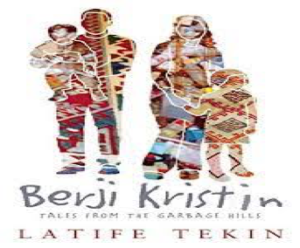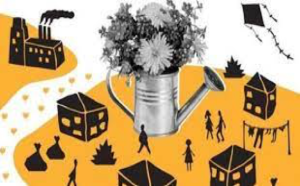Remaking of Make-Shift Lives:
Berci Kristin Çöp Masalları (1984) and Social Equality
By Yasemin Kuyucaklı Karaöz

Latife Tekin’s Berci Kristin Çöp Masalları is a riveting narrative based on a real social phenomenon, the urban sprawl in 1960’s Istanbul, which leads to the emergence of squatter settlements on the margins of the city. Tekin’s garbage hill tales, while depicting the lives of a community left destitute in the midst of toxic waste, debris of cans, boxes, and papers, problematizes the issue of social inequality, that is, poverty- one of the most significant issues the world and the EU has been facing- and the social exclusion it engenders. Nevertheless, I would suggest that Berci Kristin is not a narrative exploring the (EU) values of equality and justice in a grim or pessimistic manner but rather one that offers –through its vibrant use of language, narrative style and elements of magic realism- a representation allowing a vigorous space for resistance and hope. Despite its setting comprised of broken pieces and disintegrated lives, Berci Kristin is a novel of remaking, refashioning, and recreating amid make-shift dwellings.
Regarding the issue of social inequality and poverty, Flower Hill dwellers are indeed denied even their most basic human rights, such as the right to shelter, protection and life. Not only are they are excluded from the rest of the society, forced to live on the periphery of the city [¨ on a hill where the huge refuse bins came daily and dumped the city’s waste, eight shelters were set up near the garbage heaps (p.15) ¨], but they are also forced to live on the periphery of life having no access to the means of a dignified life. In Flower Hill, babies die on a regular basis (¨the baby who had flown off with the roof into the factory gardens was killed, trapped between fragments of stone and wood (p.20)); people scavenge garbage for food and a living. Meanwhile ¨the hut people seemed no longer people, smeared with dust, mud, nearly dead from picking over the garbage and collecting pieces of tin¨ (p.22). Moreover, their health deteriorates due to the toxic chemicals released by lightbulb and china factories (¨some made the lungs collapse, some shriveled the eye, some made a woman barren¨ (p.56)), and they are constantly subject to the harsh conditions of their day-to-day reality.
Notwithstanding their inhumane conditions exacerbated by the lack of equality and social justice, however, Flower Hill dwellers do not ever give in but resist and manage to survive. Even though it is a day-to-day survival (a life in severe material deprivation), the colorful characters of the hill hold onto life refashioning it with their laughter ¨loud and long¨, their vivid tales, and dances. Challenging their exclusion from the rest of the society, they recreate a unique language of solidarity composed of verses and songs which they collectively gather. And finally, they remake a dynamic life of their own out of the dead, that is otherwise discarded, being bits and pieces from the individuals of the mainstream society.
By demonstrating how social injustice and resistance can coexist, Latife Tekin’s Berci Kristin Çöp Masalları both intimates the urgent necessity for equality and human dignity in a society and inspires us to work –without losing hope – towards a more just future.

